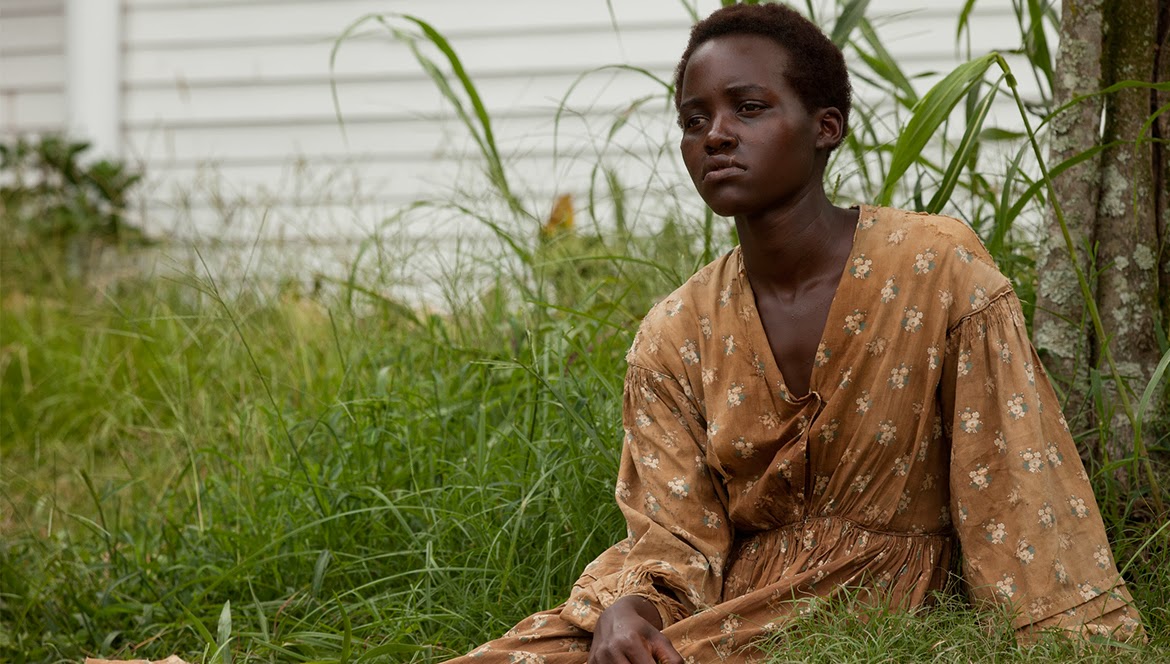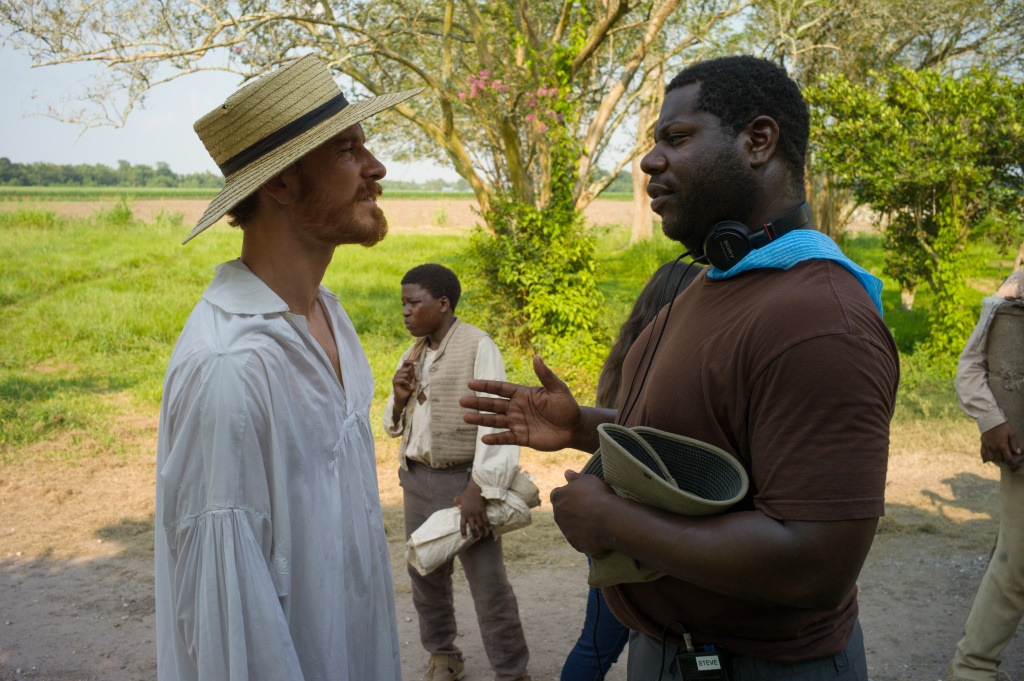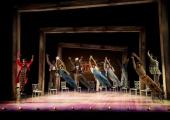Some films quite rightly have awards glory etched into their DNA, and when the admirably uncompromising Steve McQueen announced that his next project, focussing on the subject of slavery, would feature that cast, only a fool would have bet against it collecting armfuls of prizes. Moreover, the brutality and societal impact of slavery has seldom been seen on screen; thus in the words of its director, 12 Years a Slave fills "a hole in the canvass of cinema".
Based on the memoir by Solomon Northup (as told to David Wilson) and adapted for the screen by John Ridley, 12 Years a Slave sees an affluent black American – a violinist and family man born free in New York state - pitched into a waking nightmare when he's kidnapped by slavers in 1841. After a night of indulgence during which he's seemingly courted by admirers of his musicianship, Solomon (Chiwetel Ejiofor) awakens screaming in bondage before he's shipped to the south, as mere cargo, and sold to the first of several masters.
 Most memorably and extensively, the film documents Solomon's suffering at the hands of Edwin Epps, a drunken brute played with extraordinary ferocity by Michael Fassbender. Epps is a vile but utterly credible beast: a man riddled with self-hate whose explosive lust for the enslaved Patsey (Lupita Nyong'o, pictured above right) leads to him sideline his wife (Sarah Paulson). Patsey is the reluctant object of his affection and, as a result of the conflict this stirs up in him, she's also the victim of his worst cruelty.
Most memorably and extensively, the film documents Solomon's suffering at the hands of Edwin Epps, a drunken brute played with extraordinary ferocity by Michael Fassbender. Epps is a vile but utterly credible beast: a man riddled with self-hate whose explosive lust for the enslaved Patsey (Lupita Nyong'o, pictured above right) leads to him sideline his wife (Sarah Paulson). Patsey is the reluctant object of his affection and, as a result of the conflict this stirs up in him, she's also the victim of his worst cruelty.
The London-born McQueen (a former Turner Prize winning artist) has an exemplary directorial track record, having brought his talent strikingly to bear on the story of IRA martyr Bobby Sands in Hunger and on the subject of sex addiction in Shame - both of which were huge critical smashes and both of which starred Fassbender (McQueen and his muse Fassbender are pictured together below left). Whereas previously his films have been defiantly, dynamically art-house - sometimes so quietly contemplative they border on the spare - 12 Years a Slave is passionate and direct: there's no room for ambiguity here. And yet there's commonality: a marriage of sensitivity to character with fearlessness regarding controversial content; and, all three of McQueen's films have dealt in incarceration of a kind - the inhabitants of the Maze in Hunger, a man imprisoned by his own addiction in Shame and now a man caught in the shackles of slavery.
 12 Years a Slave is a true horror story which rages at the obvious injustice of slavery and the horrendous hardships suffered by slaves themselves but, perhaps most remarkably, through Epps and those like him, McQueen draws out the complex reactions of white plantation owners and workers. It shows the detrimental impact of slavery on all those it touches, not just the people it subjugates. It illustrates how society at large is poisoned, how those who keep slaves are rendered crueller and lesser, tortured by both their own capacity for sadism and their inescapable humanity, and how few had the courage to challenge the miserable status quo.
12 Years a Slave is a true horror story which rages at the obvious injustice of slavery and the horrendous hardships suffered by slaves themselves but, perhaps most remarkably, through Epps and those like him, McQueen draws out the complex reactions of white plantation owners and workers. It shows the detrimental impact of slavery on all those it touches, not just the people it subjugates. It illustrates how society at large is poisoned, how those who keep slaves are rendered crueller and lesser, tortured by both their own capacity for sadism and their inescapable humanity, and how few had the courage to challenge the miserable status quo.
As Epps, Fassbender does the near-impossible by making a man of such brutality not sympathetic exactly but certainly painfully human, laying bare his internal torture. He's an actor who seems to give himself over entirely to his roles and while Ejiofor is remarkable, holding us close on his horrifying journey, what Fassbender does with his character is nothing short of miraculous. And while 12 Years a Slave provides ample meat for its established actors (Benedict Cumberbatch, Paul Dano, Paul Giamatti and Brad Pitt feature memorably), it also helps shape a star in Nyong'o (making her film debut) who is heart-wrenchingly real as the terrorised Patsey.
12 Years a Slave isn't just expertly executed; its source material was shrewdly selected (by McQueen's partner, the cultural critic Bianca Stigter). By choosing to focus on a true story, what unfolds is rendered all the more powerful. Furthermore, Solomon's previous status as a free man, seemingly oblivious to life's worst cruelties, will make it easier for modern, affluent audiences to project themselves onto his character. That's not to play down the film's less commercial achievements, as this could hardly be described as slavery-lite. 12 Years a Slave is a film of searing sincerity and insight, whose central characters are drawn with real complexity. McQueen's third film doesn't just slide slavery under the microscope, it holds it there.
Overleaf: watch the trailer for 12 Years a Slave










 Most memorably and extensively, the film documents Solomon's suffering at the hands of Edwin Epps, a drunken brute played with extraordinary ferocity by
Most memorably and extensively, the film documents Solomon's suffering at the hands of Edwin Epps, a drunken brute played with extraordinary ferocity by  12 Years a Slave is a true horror story which rages at the obvious injustice of slavery and the horrendous hardships suffered by slaves themselves but, perhaps most remarkably, through Epps and those like him, McQueen draws out the complex reactions of white plantation owners and workers. It shows the detrimental impact of slavery on all those it touches, not just the people it subjugates. It illustrates how society at large is poisoned, how those who keep slaves are rendered crueller and lesser, tortured by both their own capacity for sadism and their inescapable humanity, and how few had the courage to challenge the miserable status quo.
12 Years a Slave is a true horror story which rages at the obvious injustice of slavery and the horrendous hardships suffered by slaves themselves but, perhaps most remarkably, through Epps and those like him, McQueen draws out the complex reactions of white plantation owners and workers. It shows the detrimental impact of slavery on all those it touches, not just the people it subjugates. It illustrates how society at large is poisoned, how those who keep slaves are rendered crueller and lesser, tortured by both their own capacity for sadism and their inescapable humanity, and how few had the courage to challenge the miserable status quo.